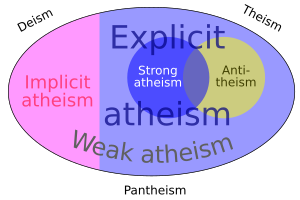From Rational Wiki:
Weak atheism (sometimes equated with "
pragmatic atheism" or "negative atheism") describes the state of living as if no gods exist. It does not require an absolute statement of God's non-existence. The argument is based on the fact that as there is no evidence that gods,
spatial teapots or fairies exist, we have no reason to believe in them. This argument could also be classified as extreme
agnosticism, or "agnostic atheism" — as it is an acknowledgment of the lack of evidence but acting as if there were no gods.
Pragmatic atheists, however, are frequently reluctant to make outright statements like "Gods (or fairies) do not exist", because of the great difficulties involved in proving the absolute non-existence of anything — the idea that nothing can be proved is held in the philosophy of
pyrrhonism. Consequently many pragmatic atheists would argue that the
burden of proof does not lie with them to provide evidence against the
extraordinary concept that gods exist. They would argue that it is up to the supporters of various religions to provide evidence for the existence of their own deities, and that no argument is necessary on the atheist's part.
Strong atheism (sometimes equated with "
theoretical atheism") makes an
explicit statement against the existence of gods. Strong atheists would disagree with weak atheists about the inability to disprove the existence of gods. Strong atheism specifically combats religious beliefs and other arguments for belief in some god (or gods), such as
Pascal's Wager, and
argument from design. These arguments tend to be geared toward demonstrating that the concept of god is logically inconsistent or incoherent in order to actively disprove the existence of a god.
[6] Theological noncognitivism, which asserts the meaninglessness of religious language, is an argument commonly invoked by strong atheists.
[note 2] In contrast, weak atheist arguments tend to concentrate on the evidence (or lack thereof) for god, while strong atheist arguments tend to concentrate on making a positive case for the non-existence of god.
Apatheism
See the main article on this topic:
Apatheism
An apatheist has no interest in accepting or denying claims that a god or gods exist or do not exist. An apatheist considers the very question of the existence or non-existence of gods or other supernatural beings to be irrelevant and not worth consideration under any circumstances.
In short: they simply don't care. (Well, OK, they care enough to give themselves a name — so that people explicitly know what it is they don't care anything about. But that's about it.)
Antitheism
See the main article on this topic:
Antitheism
Antitheism is, perhaps surprisingly, technically separate from any and all positions on the existence or non-existence of any given deity. Antitheism simply argues that a given (or all possible) human implementations of religious beliefs, metaphysically "true" or not, lead to results that are harmful and undesirable, either to the adherent, to society, or to both. As justification the antitheists will often point to the incompatibility of religion-based morality with modern humanistic values, or to the atrocities and bloodshed wrought by religion and by religious wars. Religious moderation as compared to religious extremism is an example of theistic anti-theism, also known as
dystheism. Dystheism also encompasses questioning the morals even of a deity you believe in, e.g. choosing to obey commandments on nonviolence over calls to violence from God, despite them both being clearly put forward by this alleged giver of all morals.
Post-theism is a form of atheism that doesn't so much reject
theism as believe it to be obsolete, that belief in
God belongs to a stage of
human development now past. The word stems from the
Latin post "behind, after, afterward" +
Greek theos "god" + -ist.
Though the belief system is independent from organized religions, some post-theists posit a specific religion as formerly useful. A most notable example is Frank Hugh Foster, who in a 1918 lecture announced that modern culture had arrived at a "post-theistic stage" in which humanity has taken possession of the powers of agency and creativity that had formerly been projected upon God. Another instance is
Friedrich Nietzsche's declaration that "God is dead."


